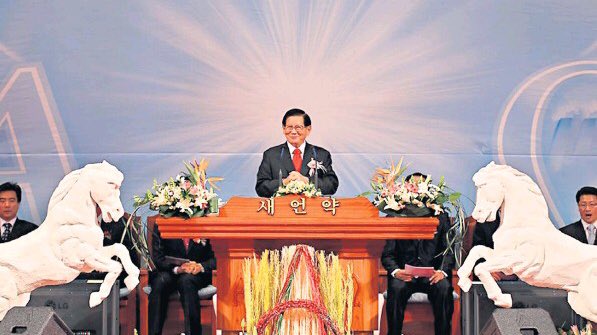The rapid proliferation of the coronavirus (COVID-19) resulted in 13 deaths and 1,766 confirmed cases as of February 27 in South Korea. While the cause and solution of the infection are not identified, Shincheonji Church, with over 500 members, has become the target of scapegoating and blame.
On February 19 South Korean President Moon Jae-In said that a full survey and diagnosis of Shincheonji members were necessary. On February 25, Shincheonji Church submitted a list of 210,000 members to health authorities on condition that their identities would be protected. On February 26, health authorities began telephone surveys and tests for those who had symptoms.
Chosun Ilbo, a major newspaper in South Korea, reported that 5 people with pneumonia tested positive for the virus after being screened by the Central Disaster and Safety Countermeasures Headquarters. This before any Shincheonji member was involved. The medical community noted that the COVID-19 cases had already proliferated before the mass infection of members of Shincheonji Church. This raised doubts on reports echoed by some Western media that patient 31, a female Shincheonji member, had been the main agent spreading the infection throughout the country.
The mass infections attracted the general attention of Shincheonji Church. Unfortunately, several media reports relied on low-level Internet sources and interviews with fundamentalist Christians who regard Shincheonji as a serious competitor and have labeled it a cult.
“Shincheonji members generally do not recognise themselves in reports they read in the media. For instance, they do not regard their founder, Chairman Lee Man Hee, as the second coming of Jesus or as God. Publishing these claims without the fact-checking shows that some media did not do their homework and only relied on hostile sources,” said Mr. Kim Shin Chang, General Director of Department of International Relations of Shincheonji Headquarters.
Shincheonji Church has been controversial in Korean society, mostly because its rapid growth in the past decade happened at the expense of the politically influential conservative and fundamentalist Christian churches in Korea, which reacted with anti-Shincheonji campaigns. Shincheonji’s members exceeded 200,000 in 2018, and this spectacular growth contrasts with the gradual decrease of members in conservative and fundamentalist Christian groups in South Korea, which have been plagued by corruption scandals.
Munwha Broadcasting Corporation (MBC), a leading South Korean television, also reported on February 26 that a female Shincheonji member fell from a window of her house and died as a result of her husband’s violence. The husband had tried to coerce her to leave Shincheonji and, before her death, the police had received reports of family violence.
As confirmed in several reports by Belgian NGO Human Rights Without Frontiers (HRWF), Shincheonji members have been the main target of kidnapping and confinement promoted by Protestant pastors with the aim of compelling them to renounce their faith, called forced conversion or deprogramming, resulting in over 1,000 human rights violation cases.
When one of its members died during a deprogramming, Shincheonji reacted with protest gatherings attended by more than 120,000 Korean citizens in January 2018 and demanded punishment on the criminal activities. The annual 2019 International Religious Freedom Report by the U.S. Department of State mentioned the incidents. However, the Korean government did not act to stop the inhuman deprogramming practice.
One reason other Christian churches attack Shincheonji is that they keep losing members. Political activism, and continuous hate speech, including anti-LGBT and anti-Islam campaigns, by conservative and fundamentalist Christian denominations, have alienated most of the Korean population, particularly the youth. In general, according to Statistics Korea, 27.7 million people, 56% of the Korean population, declare themselves non-religious. Against this backdrop, it is not surprising that Shincheonji’s growth is perceived by some as worrying.
“We are also asked why we are hiding our identity and do not tell people we are members of Shincheonji. What is happening now with the coronavirus clearly answers the question. When the fact that we belong to Shincheonji becomes known, we are forced to quit our jobs. We cannot send our kids to school. Even female members are exposed to violence as a daily routine. We fear the coronavirus, and we also fear the virus named hatred and insult,” said a member of Shincheonji.






